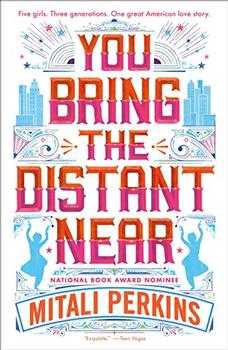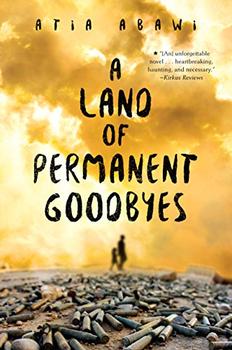Summary | Excerpt | Reviews | Beyond the book | Read-Alikes | Genres & Themes | Author Bio

"A girl like that."
We read that phrase and we know exactly what is being implied. A girl who does the wrong things. A girl who doesn't fit in. A girl who bucks the status quo and rubs people the wrong way. A girl who challenges things, gets blamed for things that go wrong in her life, and is talked about much more than she is talked to. But what happens when that girl speaks, especially in a culture where her voice is not meant to matter? Tanaz Bhathena's debut YA novel, told in flashbacks, gives life to a strong-willed, orphaned Zoroastrian girl living in Jeddah, Saudi Arabia. In a stunning narrative that proves the necessity of more diverse, own-voices young adult fiction, the world of the reader is expanded while also showing so clearly that some things are truly universal.
Zarin doesn't fit in. Orphaned at a young age, she is sent to live with an aunt and uncle whose treatment of her make this very apparent. The many constraints of being a half-Parsi Zoroastrian (see Beyond the Book) female in the patriarchal and restrictive culture of her home in Jeddah exacerbate this. Told from many points of view, Bhathena's world opens a door to multiple communities that most of us will never get to see, and while offering us a glimpse into worlds typically hidden from us, she piques our curiosity and forces us to grapple with our own selves as they might be reflected. How do we show love? How do we cause pain? What are the stories that we might tell about others; that we might tell about "girls like that" who are real people who have to deal with the consequences of whispers and rumors? Alienation and abuse are a part of Zarin's life. Whether they are happening at home, or in a socially sanctioned way at school, or coming from a culture that does not recognize the right of a woman to consent - or not - in relationships with men, we as readers find ourselves as worn down as Zarin - and through her still-unbreakable spirit - as resilient and rebellious.
The multiple voices give the reader a more complete picture of Zarin, while also calling into question the accountability of each narrator as we compare each person's view of her: the antagonistic classmate, her aunt, the boy who loves her. This is not an easy read; it is gripping, emotionally draining and stunning in its relentlessness. This is where realistic fiction thrives; we as readers want the light at the end of the tunnel, we want to be shown a sense of hope, that life can maybe become better. Instead, Bhathena gives us the darker side of reality, albeit one that is too real for too many. Where another writer might have tried to knit these perspectives together into a neat fairy-tale ending; an ending that answers the questions of who Zarin is and who she can be, Bhathena offers us, instead, the space to come to our own understanding of Zarin's truth. And it is that concept of holding on to truth, of fighting for and holding defiantly to one's identity that comes through so strongly in this narrative. The fight might be futile and without some happy ending or grand resolution, but it is what makes us who we are in the face of that which would ask us to be smaller, to conform, and to avoid being "a girl like that."
![]() This review was originally published in The BookBrowse Review in March 2018, and has been updated for the
March 2019 edition.
Click here to go to this issue.
This review was originally published in The BookBrowse Review in March 2018, and has been updated for the
March 2019 edition.
Click here to go to this issue.

If you liked A Girl Like That, try these:

by Mitali Perkins
Published 2019
This elegant young adult novel captures the immigrant experience for one Indian-American family with humor and heart.

by Atia Abawi
Published 2019
Narrated by Destiny, this heartbreaking - and timely - story of refugees escaping from war-torn Syria is masterfully told by a foreign news correspondent who experienced the crisis firsthand.
Your guide toexceptional books
BookBrowse seeks out and recommends the best in contemporary fiction and nonfiction—books that not only engage and entertain but also deepen our understanding of ourselves and the world around us.